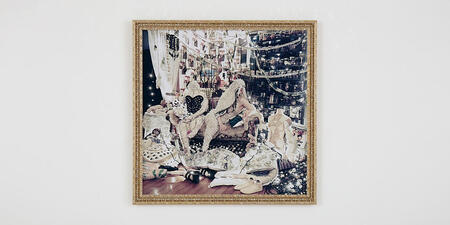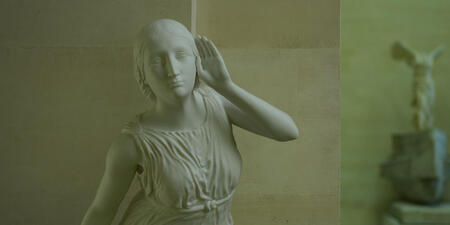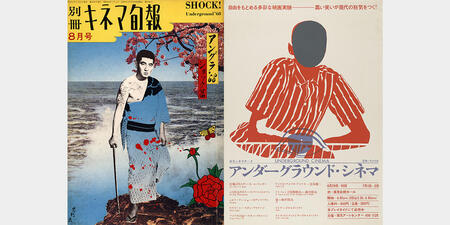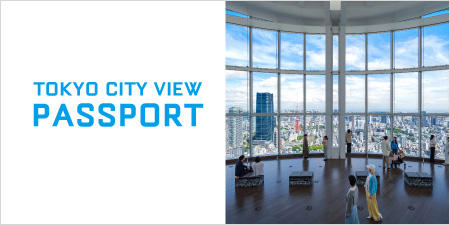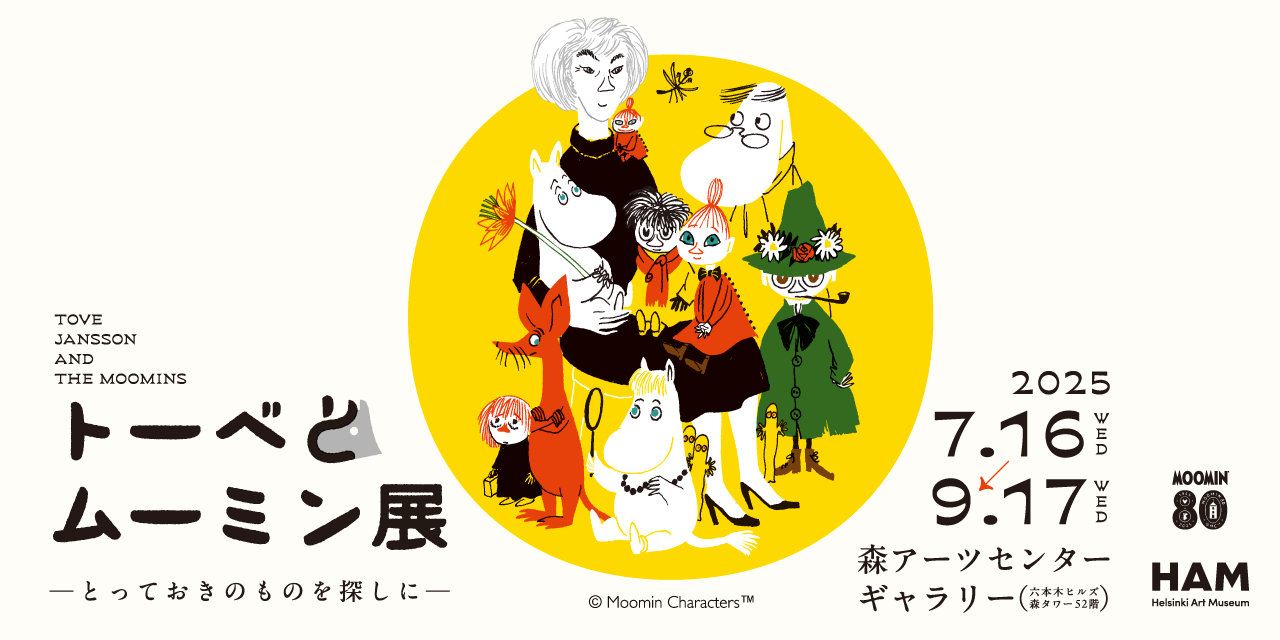List of Works
Download the work list. (PDF/458KB)
* In alphabetical order of the artists’ surnames
- Beeple
- Kate Crawford and Vladan Joler
- Diemut
- Fujikura Asako
- Hsu Chia-Wei
- Kim Ayoung
- Lu Yang
- Sato Ryotaro
- Jacolby Satterwhite
- Jakob Kudsk Steensen
- Adrián Villar Rojas
- Anicka Yi
Beeple
Born 1981 in North Fond du Lac, WI, USA; lives in Charleston, SC, USA
Beeple is a moniker of Mike Winkelmann, a digital artist, graphic designer, and animator known for his satirical images of politics and society. In 2007, he began his “Everydays” project, creating a digital image and posting it online each day. This sustained practice has continued for more than seventeen years and inspired thousands of digital artists to follow suit. Beeple first burst onto the art scene when his artwork EVERYDAYS: THE FIRST 5000 DAYS (2021) was sold at a Christie’s auction for a record-breaking price, triggering a broad awareness of digital art and NFTs globally. With the kinetic video sculpture HUMAN ONE (2021), which represents the first human born inside the metaverse journeying through the ever-changing digital landscape, Beeple introduced a life-sized physical presence to his oeuvre and specified that the artist may change the artwork at will.
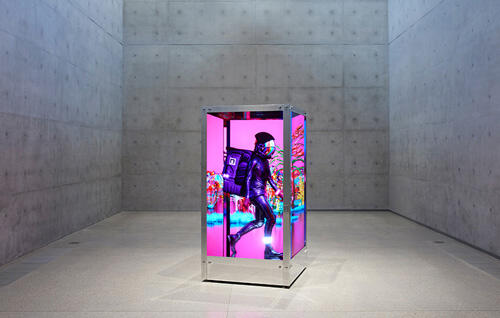
HUMAN ONE
2021-
Four video screens (16k resolution), polished aluminum metal, mahogany wood frame, media server, and endless video with corresponding dynamic nonfungible token
220 x 114.8 x 114.8 cm
Installation view: Beeple: HUMAN ONE, M+, Hong Kong, 2022-2023
Photo: Lok Cheng
Kate Crawford and Vladan Joler
Born in Sydney; lives in New York (KC)
Born in Novi Sad, Yugoslavia; lives in Novi Sad (VJ)
Kate Crawford is an internationally renowned scholar of artificial intelligence and its impact. Together with Vladan Joler, an ICT researcher, artist, and co-founder of the SHARE Foundation, they produce visual investigations such as Calculating Empires: A Genealogy of Technology and Power Since 1500 (2023), which merges research and design with science and art. Measuring over twenty-four meters long, this map charts how technology and power have been intertwined with each other since 1500. It can be seen as a necessary corrective to the current short-term bias in terms of how technology is criticized and visualized, frequently focused on the most recent spectacles and devices, rather than tracking its deeper historical and political contexts.
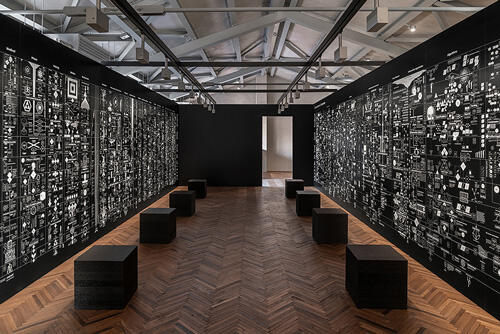
Calculating Empires: A Genealogy of Technology and Power Since 1500
2023
Installation view: Calculating Empires: A Genealogy of Technology and Power, 1500-2025, Osservatorio Fondazione Prada, Milan, 2023-2024
Photo: Piercarlo Quecchia – DSL Studio
Photo courtesy: Fondazione Prada
Diemut
Born 1982 in Berlin; lives in New York
Diemut’s work is characterized by its intrinsic entanglement of art and science, presented in a variety of experimental installations. In her projects she collaborates with scientists in the fields of AI, synthetic biology, human and plant genetics, quantum physics, and astrophysics. Three Approaches to Synthetic Entities features a dialogue between AI and humans (El Turco / Living Theater) that presents a human player hidden in the system, a debate between two adversarial AI machines (Eris’ Apple), as well as an externalized inner soliloquy (Monologue). This work reconsiders the meaning and implications of human intelligence when confronted with the capabilities of an advanced AI machine.
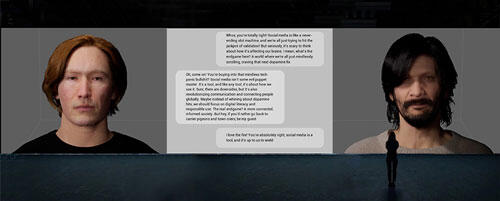
Three Approaches to Synthetic Entities
2025
AI installation
Dimensions variable
Technical collaboration with Georgia Institute of Technology, Northeastern University, and University of Utah
Production support: Anthropic
Fujikura Asako
Born 1992 in Saitama, Japan; lives in Ibaraki, Japan
In her mysterious video works produced with 3D computer graphics, industrial materials move and act like living creatures inside virtual cities. Inspired by her own early upbringing in suburban areas, where large highways and infrastructure create an unchanging and homogenized landscape, Fujikura’s works reveal the invisible laws that govern how standardized urban space is produced. At a time when architectural and urban development rely heavily on computer modeling, her practice of exploring the tension between the real and virtual through her own senses may offer a new landscape theory around contemporary cities. She is scheduled to participate in the Japanese Pavilion of the Venice Architecture Biennale in 2025.
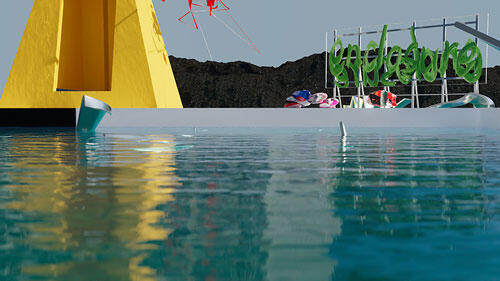
Impact Tracker
2025
3-channel video
13 min. 38 sec.
Hsu Chia-Wei
Born 1983 in Taichung, Taiwan; lives in Taipei
As an artist, filmmaker, and curator, Hsu’s work traverses the realms of film and contemporary art. His research delves into the political and industrial history of each region, often on a geological time scale. Inspired by the fact that the silicon for semiconductor wafers that are essential to modern digital technology products can be extracted from sandy beaches, his new work in this exhibition is composed of a virtual seaside, an underwater cello performance scene, and footage from the Industrial Technology Research Institute (ITRI) in Taiwan, which conducts research on chips used exclusively for AI, with music by a generative AI to examine the latest technologies at the level of their materials. In 2024, he won the Eye Art & Film Prize.

Silicon Serenade
2024
VR (virtual reality), transparent computer case, host computer, buoyant ball, and spliced screens
5 min.
Kim Ayoung
Born 1979 in Seoul; lives in Seoul
Kim creates video, virtual reality, and game simulations based on stories called “speculative fiction” that fuse geopolitics, mythology, technology, and futuristic iconography. The work Delivery Dancer’s Sphere (2022), presented in this exhibition, tells the story of female delivery riders who take on the challenge of completing their work in the shortest distance and time for delivery service to homes, which increased during the COVID-19 pandemic. These workers are invisible presences in a city where no close contact with others is to be made for delivery. The labyrinthine, fractal-like trajectory of these delivery routes ushers the viewer into another dimension. Kim won the Golden Nica in the New Animation Art category at Prix Ars Electronica in 2023, and the ACC Future Prize established by the National Asian Cultural Center in South Korea in 2024.
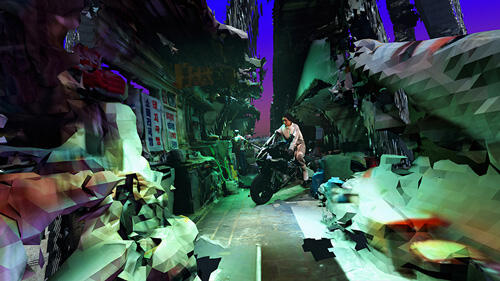
Delivery Dancer’s Sphere
2022
Video
25 min.
Lu Yang
Born in Shanghai; lives in Shanghai and Tokyo
In Lu’s video works, the transcendental power of Buddhist wisdom is mediated through new technologies and pop cultural tropes, raising fundamental questions about the human body and mind. Since 2022, he has been producing a trilogy of films titled “DOKU” (a world inspired by the Mahayana Buddhist phrase “Dokusho Dokushi” [we are born alone, and we die alone]), in which a namesake avatar, who is a digital incarnation of the artist himself, journeys through different dimensions of the Buddhist spiritual world, offering a captivating perspective towards life and death. His recent solo shows include Fondation Louis Vuitton (Paris, 2024), Kunsthalle Basel (Switzerland, 2023), and MOCA Cleveland (OH, USA, 2017). He participated in the Venice Biennale in 2022 and 2016 among other major biennales and triennials. He was awarded the BMW Art Journey in 2019 and the Deutsche Bank Artist of the Year in 2022.
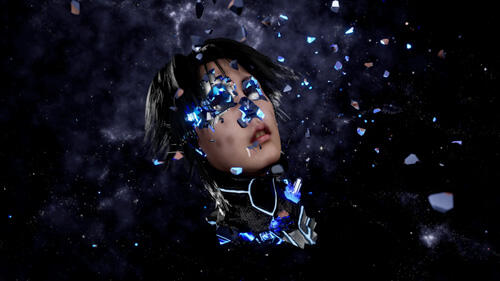
DOKU the Self
2022
Video
36 min.
Music composer and producer: liiii
Sound effect and mastering: Woody Du
Trumpet and flugelhorn: feng
Narration: Takano Shinya
Sato Ryotaro
Born 1999 in Hokkaido, Japan; lives in Kanagawa, Japan
While in graduate school, Sato began creating films using game engines based on data “assets” circulating on the Internet, such as the 3D models, textures, and animations used in video games. According to the artist, he was influenced by the culture of sampling and MAD videos (*1) in the post-Internet era. His absurd stories in which various characters such as soldiers, girls, and animals repeatedly appear recall the short stories of Abe Kobo and others, as well as the pictorial space of Surrealism, while at the same time questioning the value of human existence and life in contemporary society. In this exhibition, he will present a new video piece in which the assets characters that exist just as various signs are released into the homogenized space of a suburban area.
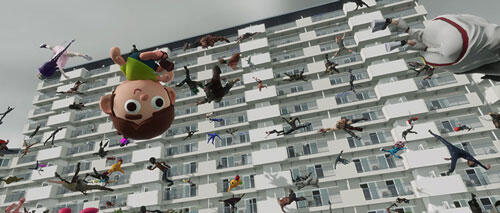
Outlet
2025
Video
11 min. 26 sec.
Jacolby Satterwhite
Born 1986 in Columbia, SC, USA; lives in New York
Satterwhite fuses an analogue-industrial understanding of technology with imagery from Afrofuturism, the African-American ideals of the future, and popular culture as a means of “queering” new technologies, creating paradigms for acting out one’s identity. His practice is also influenced by his mother Patricia Satterwhite, a self-taught artist who suffered from schizophrenia. The work for this exhibition is a continuation of A Metta Prayer, an expansive multimedia installation that fuses choreography, wallpapers, video, animation, and music to reimagine a kaleidoscopic, computer-generated world inspired by Buddhist Metta prayers, originally commissioned in 2023 for the Metropolitan Museum of Art in New York.
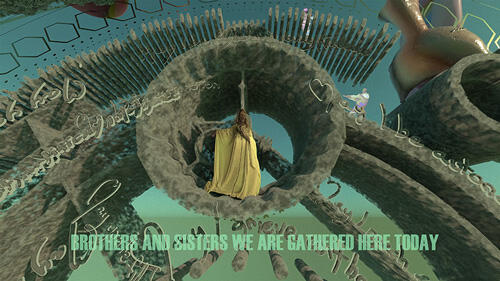
A Metta Prayer
2023
4-channel video installation
21 min. 28 sec.
Courtesy: Mitchell-Innes & Nash, New York
Jakob Kudsk Steensen
Born 1987 in Copenhagen; lives in Copenhagen
With 3D animation, sound, and gaming technology, Steensen creates immersive works that bring natural phenomena that are often overlooked to life through virtual simulations. Presented in this exhibition is The Ephemeral Lake (2024), inspired by the German Romantic painter Caspar David Friedrich and commissioned by the Hamburg Kunsthalle, comprising video, sound, and glass lamp sculptures. Examining the natural phenomenon of the “ephemeral lake” that periodically appears and disappears in dry barren land, he combined photographs, 3D scans, specimens, and sound recordings of flora and fauna and landscapes collected during his fieldwork in Death Valley and the Mojave Desert in California to create a virtual lake and its ecosystem. Its scenery continues to change in real time and evoke the viewer’s senses.
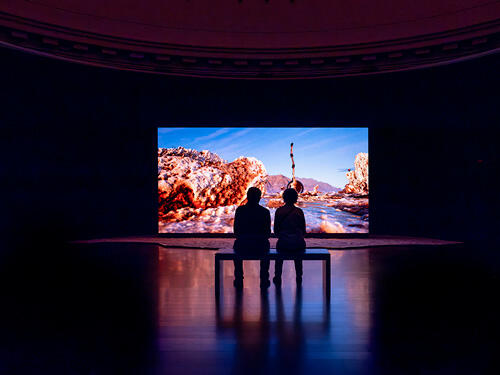
The Ephemeral Lake
2024
Live simulation and generative spatial sound
Commission: Hamburger Kunsthalle, Hamburg, Germany
Installation view: The Ephemeral Lake, Hamburger Kunsthalle, 2024
Photo: Altay Tuz
Adrián Villar Rojas
Born 1980 in Rosario, Argentina; lives and works nomadically
Villar Rojas conceives long term projects, collectively and collaboratively produced, that take the shape of large-scale and site-specific installations, both imposing and fragile. Within his research, which mixes sculpture, drawing, video, literature and performative traces, the artist explores the conditions of a humanity at risk, on the verge of extinction or already extinct, tracing the multi-species boundaries of a post-Anthropocene time folded in on itself, in which past, present and future converge. For this exhibition, the artist uses the “Time Engine,” an amalgamation of software based on procedural generation and AI, to model digital ecologies. This engine simulates conditions then produces visually rendered data of the physical consequences of time on a sculpture (or any artifact) of the artist’s design: modeling worlds, that model sculptures.
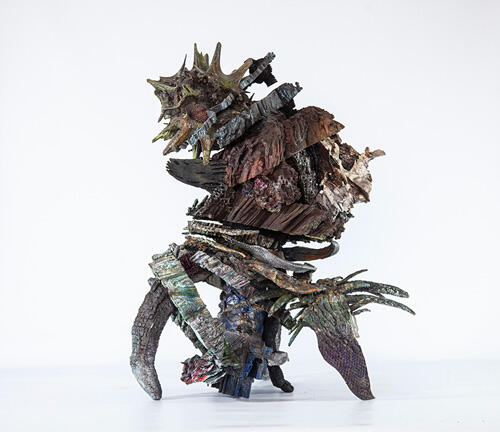
Untitled 21 (From the Series The End of Imagination)
2023
Live simulations of active digital ecologies, layered composites of organic, inorganic, and human and machine made matter
Courtesy: kurimanzutto
Anicka Yi
Born 1971 in Seoul; lives in New York
Yi has cultivated one of the most unique artistic practices that explores the fluid intersection between biology and technology. In her recent series of shimmering algorithmic “paintings,” she integrates imagery amassed through years of laboratory research with data from her earlier works. This collection is processed by machine learning generative networks that shape the compositions and materiality of these paintings. The resulting works feature multiple reflective and transparent layers that evoke the sensation of a dynamic, moving relief. Through this series, Yi also challenges the limits of human intelligence and the traditional notion of painting as a creation solely attributed to a single author, or even a human author.
![Anicka Yi Öñ0K×ñ£0K×ñ(from the series “Kñ†M£M [Quantum Foam]”)](../../../../files/exhibitions/2025/02/06/img_machine_love_02_AnickaYi.jpg)
Öñ0K×ñ£0K×ñ (from the series “Kñ†M£M [Quantum Foam]”)
2024
Acrylic, UV print, and aluminum artist’s frame
121.9 x 162.6 x 3.8 cm
Courtesy: Gladstone Gallery
Photo: David Regen
© Anicka Yi / ARS, New York / JASPAR, Tokyo, 2025 G3746



